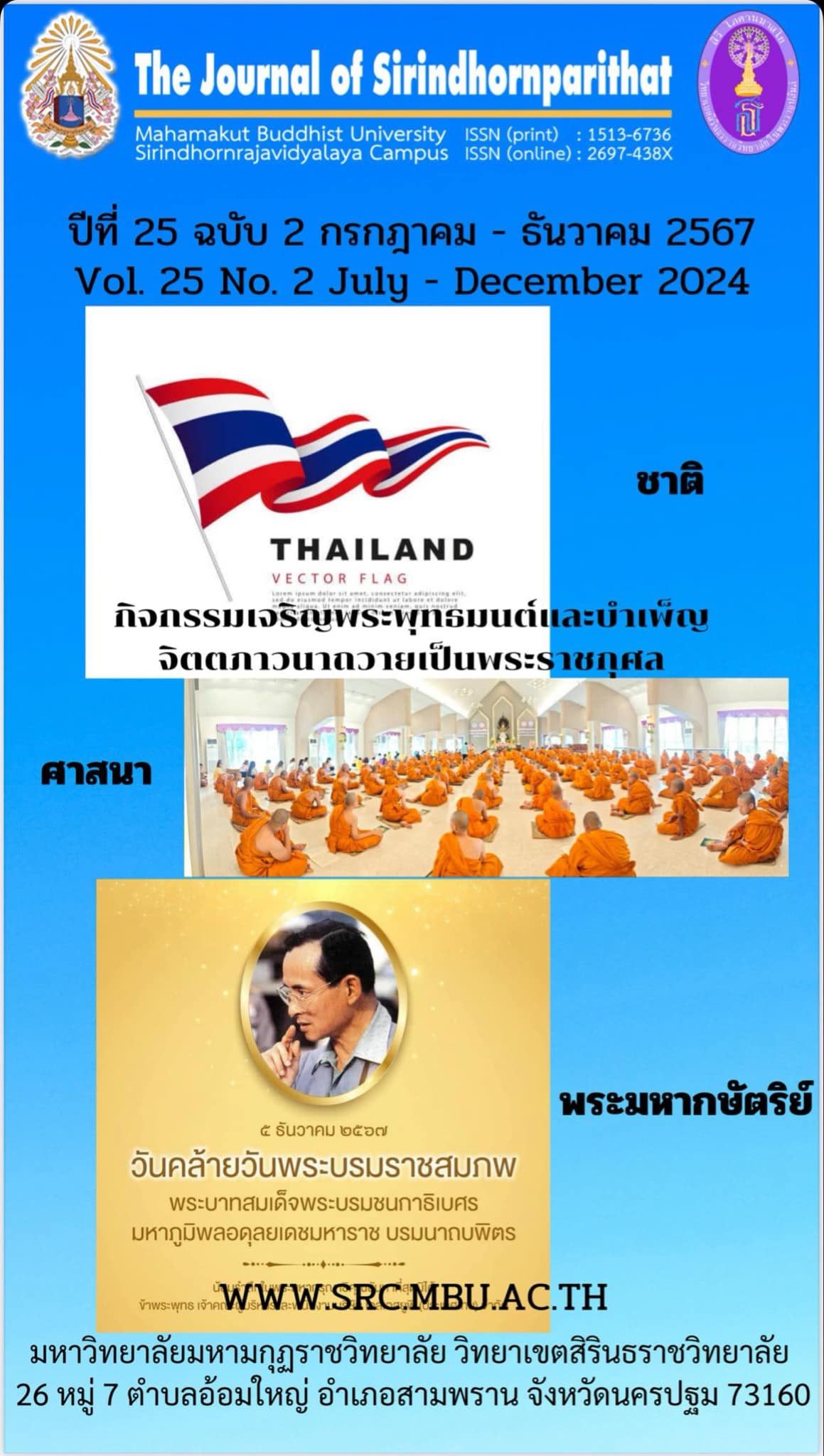Instructional Leadership of Directors in The Special Education Center in Educational Institution Group of Special Education Bureau Group 1
Keywords:
Instructional Leadership, School Directors at Special Education Centers School, Office of Special Education Administration Group 1Abstract
This research’s objectives were 1) to investigate the level of director’s instructional leadership of special education centers under the office of special education bureau group 1, 2) to compare director’s instructional leadership of special education centers under the office of special education bureau group 1 according to their age and, 3) to compare director’s instructional leadership of special education centers under the office of special education bureau group 1 according to their work experience. The sample was 300 teachers of special education centers under the office of special education bureau group 1, who were selected by the method of disproportionate stratified random sampling. 5-point Likert scale questionnaire with the reliability score of .92 was implemented to gather data. The utilized research statistics were mean, standard deviation, and one-way ANOVA.
The research findings stated that:
- The overall instructional leadership of directors at special education centers under the office of special education bureau group 1 was ranked as high by the teachers.
- Teachers with different age differently viewed the overall and each variable of instructional leadership of directors at special education centers under the office of special education bureau group 1 at significance value of 0.05.
3. Teachers with different work experience differently viewed the overall and each variable of instructional leadership of directors at special education centers under the office of special education bureau group 1 at significance value of 0.05.
References
กระทรวงศึกษาธิการ (2563). พระราชบัญญัติการจัดการศึกษาสำหรับคนพิการ พ. ศ. 2551. Retrieved Retrieved June 15, 2023 from https://shorturl.at/vyMV5
กรรณิการ์ วีระวงค์. (2564). ภาวะผู้นำทางวิชาการของผู้บริหารสถานศึกษา สังกัดสำนักงานเขตพื้นที่การศึกษาประถมศึกษาเชียงราย เขต 3. วิทยานิพนธ์การบริหารการศึกษามหาบัณฑิต. บัณฑิตวิทยาลัย มหาวิทยาลัยพะเยา.
บุญชม ศรีสะอาด. (2558). การวิจัยเบื้องต้น (พิมพ์ครั้งที่ 9). กรุงเทพมหานคร: สุริยาสาส์น.
ศุภชัย ประเสริฐนู. (2557). ความสัมพันธ์ระหว่างภาวะผู้นำทางวิชาการของผู้บริหารโรงเรียนกับการบริหารจัดการโรงเรียนแกนนำจัดการเรียนร่วมในจังหวัดเครือข่ายศูนย์การศึกษาพิเศษเขตการศึกษา 9. วิทยานิพนธ์ศึกษาศาสตรมหาบัณฑิต บัณฑิตวิทยาลัย มหาวิทยาลัยธุรกิจบัณฑิตย์.
สำนักบริหารงานการศึกษาพิเศษ. (2562). ข้อมูลทั่วไปกลุ่มสถานศึกษา สังกัดสำนักบริหารงานการศึกษาพิเศษ. Retrieved May 15, 2023 from http://special.obec.go.th/article2.php
สำนักบริหารงานการศึกษาพิเศษ (2565). กลุ่มสถานศึกษาสังกัดสำนักบริหารงานการศึกษาพิเศษ กลุ่ม 1. Retrieved May 15, 2023 from http://special.obec.go.th/HV3/c1_group.php
สมมาตร สุวรรณขำ. (2565). ภาวะผู้นำทางวิชาการของผู้บริหารสถานศึกษาตามทัศนะของครู สังกัดสำนัก งานเขตพื้นที่การศึกษาประถมศึกษาสงขลา เขต 3. วิทยานิพนธ์ครุศาสตรมหาบัณฑิต. บัณฑิตวิทยาลัย มหาวิทยาลัยราชภัฏสงขลา.
รุ่ง แก้วแดง. (2558). ปฏิบัติการศึกษาไทย. กรุงเทพมหานคร: มติชน.
ศูนย์การศึกษาพิเศษนนทบุรี. (2564). บทบาทหน้าที่ของศูนย์การศึกษาพิเศษ. Retrieved June 15, 2023 from http://www.nonthaburispc.com/?p=1822
อมร บุญโญปกรณ์. (2554). พฤติกรรมภาวะผู้นำทางวิชาการของผู้บริหารโรงเรียนระดับประถมศึกษา สังกัดสำนักงานเขตพื้นที่การศึกษาประถมศึกษาสมุทรปราการ เขต 1 ตามความคิดเห็นของครูและผู้บริหาร. วิทยานิพนธ์ครุศาสตรมหาบัณฑิต สาขาบริหารการศึกษา. บัณฑิตวิทยาลัย. มหาวิทยาลัยรัชภัฎธนบุรี.
อิทธิพัทธ์ สุวทันพรกูล. (2562). การวิจัยทางการศึกษา : แนวคิดและการประยุกต์ใช้. กรุงเทพมหานคร: ภาควิชาการวัดผลและวิจัยการศึกษา คณะศึกษาศาสตร์ มหาวิทยาลัยศรีนครินทรวิโรฒ.
Hallinger, P. (2009). Educational Leadership: Culture and Diversity. Gates head: Athenaeum.
Hallinger, P. and Murphy, J. (1985). Assessing the Instructional Management Behaviour of Principals. The Elementary School Journal. 86: 217-247.
Krug, S. E. (1992). Developing social skills. New York: University of Illinois.
Likert, R. A (1932). Technique for the Measurement of Attitude. Archives Psychological. 3(1): 42-48.
Murphy, J. (1990). “Principal instructional leadership”. In L.S. Lotto and P.W. Thurston (Eds.), Advances in educational Administration: Changing perspectives on the school, vol.1. Greenwich, Conn.: JAI Press.
Weber, J. (1996). Leading the instructional program. In S. Smith & P. Piele (Eds.). School leadership. (pp. 253-278). Eugene, Oregon: Clearinghouse of Educational Management.
Downloads
Published
Issue
Section
License
Copyright (c) 2024 Mahamakut Buddhist University

This work is licensed under a Creative Commons Attribution-NonCommercial-NoDerivatives 4.0 International License.
บทความที่ได้รับการตีพิมพ์เป็นลิขสิทธิ์ของ มหาวิทยาลัยมหามกุฏราชวิทยาลัย วิทยาเขตสิรินธรราชวิทยาลัย
ข้อความที่ปรากฏในบทความแต่ละเรื่องในวารสารวิชาการเล่มนี้เป็นความคิดเห็นส่วนตัวของผู้เขียนแต่ละท่านไม่เกี่ยวข้องกับหาวิทยาลัยมหามกุฏราชวิทยาลัย วิทยาเขตสิรินธรราชวิทยาลัย และคณาจารย์ท่านอื่นๆในมหาวิทยาลัยฯ แต่อย่างใด ความรับผิดชอบองค์ประกอบทั้งหมดของบทความแต่ละเรื่องเป็นของผู้เขียนแต่ละท่าน หากมีความผิดพลาดใดๆ ผู้เขียนแต่ละท่านจะรับผิดชอบบทความของตนเองแต่ผู้เดียว



